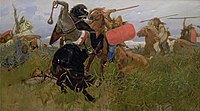
Back نياز Arabic Kniaz AST Knyaz Azerbaijani Кенәз Bashkir Князь Byelorussian Князь BE-X-OLD Княз Bulgarian Knez BS Kniaz Catalan Kňaz Czech

 |
| Knyaz (sovereign) |
| Boyar / Szlachta (noble) |
| Druzhinnik (retainer) |
| Smerd (free tenant) |
| Kholop (slave) |
Knyaz, kniaz or knez (Old Church Slavonic: кънѧѕь, kŭnędzĭ) is a historical Slavic title, used both as a royal and noble title in different times of history and different ancient Slavic lands. It is usually translated into English as prince or duke, depending on specific historical context and the potentially known Latin equivalents of the title for each bearer of the name. These translations probably derive from the fact that the title tsar was often treated as equivalent to "king" by European monarchs. In Latin sources the title is usually translated as princeps, but the word was originally derived from the common Germanic *kuningaz (king).[1]
The female form transliterated from Bulgarian and Russian is knyaginya (княгиня), kneginja in Slovene and Serbo-Croatian (Serbian Cyrillic: кнегиња), kniahinia (княгіня) in Belarusian and kniazioŭna (князёўна) is the daughter of the prince, kniahynia (княгиня) in Ukrainian and kniazivna (князівна) is the daughter of the prince. In Russian, the daughter of a knyaz is knyazhna (княжна). In Russian, the son of a knyaz is knyazhich (княжич in its old form).[2]
The title is pronounced and written similarly in different European languages. In Serbo-Croatian and some West Slavic languages, the word has later come to denote "lord", and in Czech, Polish and Slovak also came to mean "priest" (kněz, ksiądz, kňaz) as well as "prince/duke" (knez, kníže, książę, knieža).[3] In Sorbian it means simply "Mister" (from "Master". Compare French monsieur from mon sieur "my lord"), and the Catholic title "monsignor" for a priest. Today the term knez is still used as the most common translation of "prince" in Slovenian, Bosnian, Croatian and Serbian literature. Knez is also found as a surname in former Yugoslavia.[4]
- ^ de Madariaga, I. (1997) "Tsar into emperor: the title of Peter the Great", in Hatton, R.M. et al. Royal and Republican Sovereignty in Early Modern Europe, Cambridge University Press: Cambridge. ISBN 9780521026512, p. 354
- ^ Даль В. Толковый словарь живого великорусского языка в 4-х т. М., 1956. Т. 2, с. 126; Рабинович М. Г. Очерки этнографии феодального города. М., 1978, с. 228.
- ^ "князь". "Vasmer's Etymological Dictionary" online
- ^ Фроянов И. Я. Киевская Русь. Л., 1980. С. 17
© MMXXIII Rich X Search. We shall prevail. All rights reserved. Rich X Search